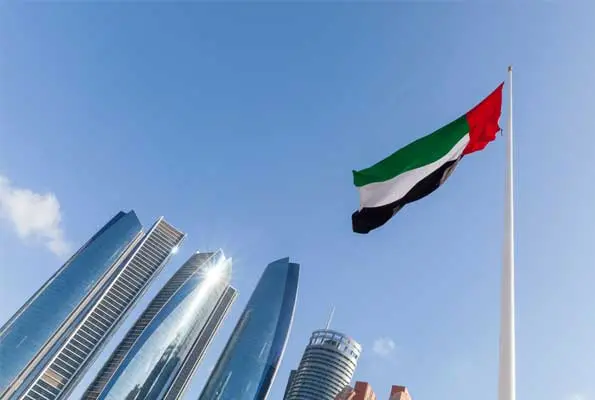The UAE is on the way to double its economic growth in 2024 on the back of strong expansion in the non-oil sector and high oil revenues.
The Gulf country’s GDP is expected to reach 4.8% in 2024, up from 2.4% in 2023, the latest Economic Insight commissioned by ICAEW (Institute of Chartered Accountants in England and Wales) and compiled by Oxford Economics said.
Meanwhile, The UAE Central Bank kept its benchmark interest rate steady, following the United States Federal Reserve’s move to maintain its monetary policy for the third consecutive time in 2023 amid a slowing economy and a gradual drop in core inflation.
The American central bank left the federal funds rate between 5.25-5.5%, which is at its highest level since 2001.
Since consumer prices in the world’s biggest economy soared to a four-decade high in 2022 June, the Fed has started its battle to bring the domestic inflation down to its target range of 2%.
While inflation in the United States increased 3.1% in November 2023 from 12 months earlier, it has decelerated from its four-decade peak of 9.1% in June 2022. Since most central banks in the Gulf region, except Kuwait, follow the Fed’s policy rate moves due to their currencies being pegged to the US dollar, UAE maintaining its base rate for the overnight deposit facility at 5.4% was expected by the analysts.
The UAE central bank has also maintained the rate applicable to borrowing short-term liquidity from the regulator through all standing credit facilities at 50 bps above the base rate.
The report also noted that the UAE’s GDP already grew by 3.7% year-on-year in the second quarter of 2022, supported by the nation’s non-oil sector’s performance.
Fiscal surpluses will be above 5% of GDP in the near and medium term, the study noted, while adding that in 2022, fiscal surpluses already exceeded 9% of GDP. This particular ratio was the second highest in the Gulf region after Qatar, driven by revenue growth of 31.8%, mostly due to higher oil revenues generated by the UAE.
“This fiscal resilience has been further bolstered by the growth of the non-oil sector, providing a stable alternative revenue stream,” the report remarked further.
The purchasing managers’ index (PMI) hit 57.7 in October 2023, the highest since the COVID-19 pandemic, while the credit sector was also seen on a growth path, with retail loans rising by nearly 10% year-on-year despite higher borrowing costs.
The OPEC (Organisation of Petroleum Exporting Countries) too has recognised the strong performance put up by the UAE’s non-oil sectors. In its December 2023 report, OPEC said that the UAE “economy demonstrated strong underlying dynamics,” which has resulted in economic growth of 3.7% year-on-year in 2023.
OPEC now expects that the upward activity trajectory from the non-oil sectors will continue, which will propel UAE’s growth further in 2024.
The ICAEW and Oxford Economics report sees UAE’s oil output averaging at 3.35 million barrels per day (bpd) in 2024, which the study considers as a ‘robust’ one, though below the Gulf nation’s maximum capacity of around 4.5 million bpd.
Since the nation successfully hosted the 2023 chapter of the United Nations Climate Change Conference (CCOP28), the ICAEW and Oxford Economics study also sees heightened activities in the sustainability-linked businesses.
“The recent successful sovereign bond sale, which raised USD 1.5 billion has bolstered these efforts. The country’s forthcoming integration into the BRICS block in January marks a significant milestone, enhancing trade and investment opportunities and supporting its diversification strategy,” the report said.
“The UAE is also making significant headway in green sukuk financing, allocating funds to sustainable projects and advancing its net-zero transition. Post COP28, the UAE is expected to intensify efforts towards fulfilling its net-zero commitments,” it concluded.



